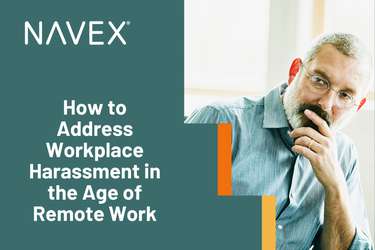This blog is part of the You Can't Delegate Ethics campaign. The campaign posits that systemic change on the issue of sexual harassment will occur only when good people in power take responsibility for the issue and create workplaces that do not tolerate it.
Empathy. We hear that word a lot these days in the wake of #MeToo, school shootings and other highly publicized acts of violence and incivility. We shake our heads and ask how can a person commit these acts against another human being? The perpetrators seemed to act without empathy – without taking into account the feelings and point of view of their victims. Sexual harassment is a glaring example of what can happen when potential perpetrators do not put themselves in their victims’ shoes. People become dehumanized targets of demeaning or even violent behavior.
An organization without empathy creates environments in which people only lookout for themselves and force others to have to lookout for themselves.
Dehumanization can be in the villainous forms above, but also in more subtle forms of workplace discrimination and harassment. An organization without empathy creates environments in which people only lookout for themselves and force others to have to lookout for themselves. This creates a negative work environment, personal harm, loss of productivity, attrition and a drag on the bottom line.
What We Know about Empathy
We know some basic information about the nature of empathy and its importance in preventing uncivil conduct, even in the workplace.
- Empathy is something you are born with, though some people naturally display more empathy than others. We’ve all heard about someone who risks their life to save a drowning stranger. And we’ve also heard about bystanders who do not intervene, and even watch, while a victim suffers an atrocious act. These are the extremes of in-born empathy.
- As people climb their industry/organizational hierarchy, increasing in power and control, they gradually lose the ability to empathize with others. They start to see other people as objects instead of human beings. They have brain changes associated with the loss of empathy. This inverse power-empathy relationship is often a factor in headline sexual harassment/assault cases and in more subtle, everyday forms of discrimination, harassment and incivility.
- We can learn to increase our empathy. Self-awareness of our own empathic shortcomings opens the door. Focusing attentively on those we interact with helps us to better understand their perspective. Asking a trusted colleague for feedback on our own verbal and non-verbal communication in various situations removes our blinders and give us concrete ideas for improving our level of empathy.
- Empathy in organizations builds trust among the workforce and establishes respect as the foundation for how we do business. It can end sexual harassment and all other forms of disrespectful conduct.
Given the power of empathy to transform our workplaces and our society, why isn’t every corporate leader rushing to increase their in-born level of empathy as well as that of their entire workforce?
eBook: The C-Suite Can't Delegate Ethics on the Issue of Sexual Harassment
Motivating Empathy & Creating Time for Ethical Decision Making
A willingness to recognize instances when we must control our impulse to feed our egos by dehumanizing others is the first step in reversing incivility, including sexual harassment, in the workplace and in the world.
Here’s the hard answer. Improving empathy starts with motivation. When it comes to soft skills like empathy, are we motivated to be motivated? Are there incentives to be aware of our own flaws; to be consistently laser-focused on others when interacting; to always treat others as they want to be treated? In our modern “Me” culture, are ego-driven individuals really motivated to recognize situations that require prioritizing someone else? A willingness to recognize instances when we must control our impulse to feed our egos by dehumanizing others is the first step in reversing incivility, including sexual harassment, in the workplace and in the world.
The next step is pausing to think and consider. Is the conduct I am contemplating or witnessing something I would want my loved one to experience? Research has found that ethical thinking takes more time than our quick, intuitive system of decision-making*. The same is true of empathetic thinking. The perspective gained in those micro-seconds has the power to avert the humiliation or degradation of another human being.
If people who harass others based on gender – call them bullies, predators, harassers, jerks, power-mongers – were to reflect, even one moment, about their own loved one enduring such treatment, their in-born wiring for empathy may just stop them before they act. And if they still step over the line, they can learn to empathize – but only if they are motivated.
In the wake of #MeToo and the ongoing stream of sexual harassment news stories, many organizational leaders are immobilized by fear of doing the wrong thing and becoming a headline themselves. In some organizations, this is causing an extreme pendulum swing where women are being marginalized and denied opportunities that may put them in one-on-one contact with men. This clearly can cause a whole host of new problems. Fear of these extremes could be the best motivator of all to work on increasing organizational empathy.
But why let fear drive such a critical change? Let’s commit to setting aside our egos and start embracing empathy because it is simply the right thing to do, for our coworkers, our organizations and our communities.
Related Articles
- Zero-Tolerance on Sexual Harassment Goes Beyond Resolving Individual Incidents
- You’re Biased and That’s Normal. Also, Norms Need to Change
- Younger Generations in the Workforce Are Making Sexual Harassment & Discrimination a Board Issue
- People Are the Cause, and the Solution, to Sexual Harassment in the Workplace
- Directors Need to Step Outside the Boardroom on the Issue of Sexual Harassment
- You Can’t Delegate the Ethics of Respect & Dignity
- We Need to Talk About Gray Areas When Addressing Sexual Harassment
- The Sexual Harassment Scandals are a Watershed Moment but We’ve Had Those Before
- You Can’t Delegate Ethics on the Issue of Sexual Harassment
*Bazerman, M. and Tenbrunsel, A., Blind Spots: Why We Fail to Do What’s Right and What to Do about It, Princeton University Press, 2011.









